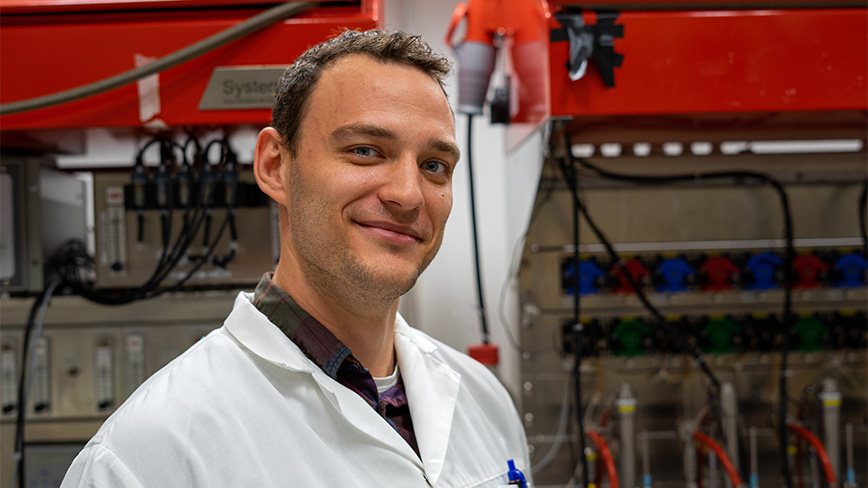Awarded doctoral student studies biofuels from inedible crops

Teun Kuil, doctoral student at the department Industrial Biotechnology, has received the 2022 ESBES award for the combination of best abstract and presentation.
“It was a big surprise and I feel honored to receive this prestigious award. I am happy that the work we do in the department of Industrial Biotechnology at KTH is valued by the jury”, says Teun Kuil.
The ESBES award is granted by the European Society of Biochemical Engineering Sciences to a promising young scientist or engineer working in the field of biochemical engineering. The award was handed out at the at the joint ProcessNet & DECHEMA-BioTechNet conference and 13th ESBES Symposium in Aachen, Germany.
What does this award mean to you and your research?
Receiving this award is a great recognition for the work we do in the Clostridium thermocellum group and creates more visibility for our research. It shows that second-generation biofuel production using Clostridium thermocellum is a promising strategy to make fuel production more economical and sustainable. In addition, it gave me even more motivation to continue with this important research.
What is your research about?
My research focuses on the production of second-generation biofuels. These are fuels that are produced from lignocellulosic biomass – the inedible parts of agricultural crops, or dedicated crops grown on land unsuitable for food production. Since these biofuels are not produced from edible agricultural products, such as maize, sugar cane, or soy, they do not clash with food production or increase land-use, providing a more sustainable option than today´s biofuels. One major problem is however that the state-of-the-art production process for second-generation biofuels is not cost-competitive with petrochemically derived fuels.
In our lab we study the thermophilic anaerobic bacterium Clostridium thermocellum, which is an organism that is very efficient in breaking down lignocellulosic material and as such could offer significant cost-reductions for the most expensive steps in the production process. This organism is however not that good in producing the fuel we need which is one of the focus points of the research we do in our lab. We try to understand the central metabolism of this organism better and use that to propose genetic and process engineering strategies aimed at making the cell a better biofuel producer.
Why are you interested in this subject?
I believe that if we want to reach the climate goals that we have set out for 2030 and beyond, we will need to shift from petrochemically-derived fuels and chemicals to more sustainable biological alternatives that are produced with microorganisms and enzymes. I believe that our work can contribute to this.
Text: Sabina Fabrizi
